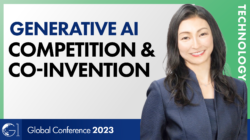It has often been said, “If it ain’t broke, don’t fix it.” While this old adage may be well-intentioned, it certainly doesn’t inspire much in the way of innovation. After all, just because something isn’t broken doesn’t mean it can’t be improved.
When it comes to education, of course, there are plenty of people around the world who would argue that their country’s system is well overdue for an overhaul. There’s a lot of talk about what and how we teach our children, but what about the why? Education is meant to prepare people for the future, isn’t it? So as the future rapidly, globally, and continuously takes on a new shape for the Technovate era, how can education possibly keep up?
The time to innovate and reshape education everywhere is now.
As we move in an increasingly digital direction, it’s not enough to reshape education by digitalizing how we learn. We need to equip the educated with digital skills, as well as the technical prowess to evolve those skills independently as needed. Graduating high school or university no longer means you’re set with the core skills you’ll need for life. Those core skills are evolving, and they’re evolving fast. If you’ve ever heard of Moore’s Law, you know that keeping up with new technology is only going to get tougher. Computing power is advancing and integrating into our world at an exponential rate. With that power comes a demand for new, cutting-edge skills that are constantly replacing each other.
Can we reshape education to ensure the young and old are learning the job skills of tomorrow? Or do we need a new system altogether to prepare us for the future of work? How much of the burden to educate should actually be on the system, and how much should be self-study?
Dr. Daniel P. Ahn offers his opinion on what changes we need in order to avoid an education bottleneck in the future of work and achieve true lifelong learning.
Next Article
How COVID-19 Is Digitizing Education in the Blink of an Eye
3 Building Blocks for Your Dream Career: Opportunities, Goals, and Values
“People [need] to transform their internal human capital more dynamically to respond to a dynamic economy.”
Transcript:
Dr. Robert Allan Feldman:
First of all, I think all of our panelists mentioned the notion of retraining and that we have to get people retrained for a different kind of world. Where do you think the bottlenecks are in our education system in getting people trained and retrained to do these jobs of the future?
Dr. Daniel P. Ahn:
So obviously more emphasis on stem education, on computer science, data science, and statistics are all very valuable, but I think it’s going to be even more broad than just more emphasis on a particular kind of subject. It needs to be more flexible now.
It’s sort of, again, part of this theme of people now providing value to the economy in more flexible ways than working at the same company for thirty, forty years. It’s [also] going to require people to be able to transform their internal human capital more dynamically to respond to a dynamic economy. And that is going to mean—and I’m sure many of you are already familiar with this concept—lifelong learning, or recurrent learning. The rise of online courses. I have taken many online courses recently myself.
[In] this process, it’s no longer going through the standard education system, and then your formal education is complete, and now you are just entering the labor force and gaining work experience. I don’t think that the rigidities in that system are going to give way to a much more dynamic system of continued human capital appreciation all throughout one’s entire life.




